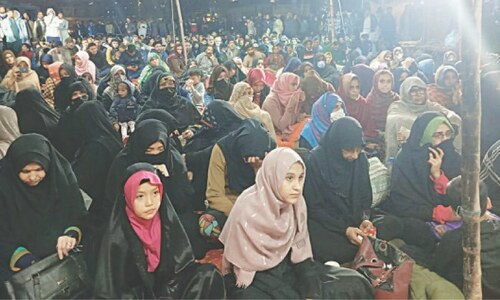KARACHI, July 10: While the city on Sunday returned to a semblance of normality as guns fell silent in the strife-hit Orangi Town after four days of intense violence, residents in different parts of the town were still too afraid to step out.
The polarisation of the populace was in evidence during a visit by this reporter to the town where residents were found confined to their neighbourhoods, afraid to pass through the areas marked with telltale signs of weeklong violence.
Nearly 100 people were killed and wounded in firing incidents in Orangi Town and its adjoining area of Baldia Town last week.
It seemed as if the recent wave of violence had brought back the memories of the Aligarh-Qasba riots of 1987 to the residents who still found themselves under a virtual state of siege.
“Firing stopped on Saturday only when Rangers and police stepped in. Otherwise we had been confined to our houses to protect ourselves from bullets being fired from the hills,” said Nadeemuddin, a resident of Qasba Colony Sector-A.
“We had been under a virtual state of siege in our own area for many days and had run out of food and milk.”
Recalling the frightening memories, Nadeem explained that as an exit strategy, residents had carved out holes through the walls they shared with their neighbours so that women and children could evacuate if the neighborhood was attacked — a distinct possibility in the dark unprotected days of violence.
The Sector-A of Qasba Colony, located in the foothills of the Kati Pahari, was one of the worst-hit areas of the violence where some houses were set on fire besides the intense firing that was carried out from the hills.
During our visit to the area, residents showed to the Dawn team a house whose roof had been damaged by attackers. “The intruders reached the rooftop by scaling the wall of the neighbouring private school, and finally dropped concrete blocks to damage the asbestos roof,” the residents said.
“As if bullets were not enough, they hurled rocks at our homes,” a woman broke into tears while pointing at the floor strewn with rocks.
The street was covered with rocks of different sizes and most houses had marks of gunshots on their walls. There was hardly any house without bullets in its walls.
During the violence, which had an unmistakable ethnic dimension, several deaths were caused by stray bullets while in some cases people were killed inside their houses.
During the visit, a family was seen leaving the Qasba Colony Sector-A while a few families were seen returning to the Kati Pahari area on Sunday.
A resident was of the view that those who had their relatives in other parts of the city have already moved out.
“Why would they return to this area where there is still no electricity, water supply and uncertainty still looms large?”
wondered Mohammad Ali.
Staying back amid all sorts of problems, he explained people like him could not afford to leave for fear of forced occupation of their homes.
Sensing elements of a conspiracy, some residents of the violence-hit areas questioned as to why Rangers and police had abandoned their posts overseeing Kati Pahari when the recent violence had erupted on Tuesday.
In the absence of TV news due to a massive power breakdown in the area, a couple of women who had come out of their houses to speak to Dawn said that amid intense firing, they had called the police helpline. “In response, the policemen hurled abuses saying that you people enjoyed eight years of the Mushrarraf government; now bear the situation.”
However, the state of affairs seemed better in Sector 9 of Orangi Town where people were found buying groceries at a shop which according to them had opened after four days of violence.
“We had run out of supplies. To make matters worse, they [the attackers] blew up a PMT [pole-mounted transformer] by firing at it causing a blackout,” a resident complained.
There was some activity along the road linking Shahrah-e-Noor Jehan with Manghopir Road, which has been carved out from the hill better known as ‘Kati Pahari’, where police and Rangers have taken positions.
Politicians belonging to different parties were also seen visiting the Kati Pahari area and talking to the people where the media which was present.
But Manghopir Road still wore a deserted look with almost all roadside eateries closed. Normally, the restaurants remained open round the clock.














































Dear visitor, the comments section is undergoing an overhaul and will return soon.